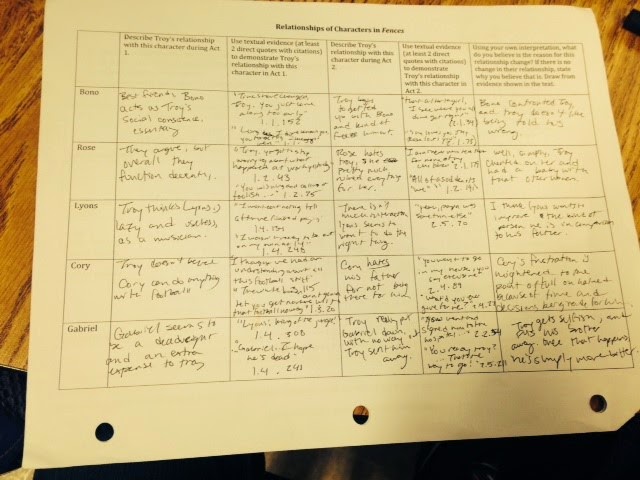Fences Socratic Seminar items
Part 1: 3x3 matrix
Troy is Closedminded
Decisions hurt family
Troy is dead
Part 2: Fences Questions
- This description establishes Troy as an almost overwhelming character, somewhat arrogant, in a way. I Imagine a figure with his arms spread out, looking over everything as if they own it, looking down on everything. The imagery almost reminds me of how a ‘godlike statue’ or something of the sort would be described. This being said, I do think Troy believes he’s above other people, but I think he’s risen above. He still isn’t where he wants to be, therefore he still is striving to fill out his hands with accommodation.
- Bono seems to act as Troy’s conscience for the most part. For example, Bono is the one to confront Troy about his affair with Alberta, saying “You been doing more than eyeing her” (1.1.45). He consistently reminds him of his responsibilities, saying, “She loves you, Troy. Rose loves you” (2.1.72). Bono is also the one Troy always seems to be trying to prove something to. Troy is telling Bono to listen to Lyons, to see and to recognize that, in Troy’s eyes, all Lyons wants is money. He does this in the same way one might try to rationalize with their conscience.
- I think the climax of Fences is when Troy finally tells Rose about his affair with Alberta, and they had a massive argument. A lot of the action leading up to that point, particularly having to do with Bono, had dealt with handling the issue of Troy’s cheating, and after that argument, everything in the play that happened, especially in terms of Rose, dealt with how to take care of Raynell.
- The blues as a musical genre is usually a style where one sings about their hardships, and that the struggle just keeps on going. I see blues in the overall themes of the play; not only that Lyons wants to be a Jazz musician—another style of music that has roots in the African American culture—but also in that there is constant misfortune after misfortune. Not only the music and themes, but also even the dialect coming from all of the speakers was somewhat representative of some of the slurring in blues music.
- I think that Gabriel s kind of useless in terms of this play. I understand his function earlier on, but toward the end, his blowing on his ‘trumpet’ makes absolutely no sense, other than the obvious ‘Gabriel the angel blows a horn’ symbolism aspect. Overall I think that it’s out of place and serves no real purpose.
- It’s no secret that there are a multitude of allusions throughout Fences. As far as Biblical Allusions go, Gabriel is the strongest example. Gabriel is the name of an angel, and at the end of the play, after he blows his horn, the heavens explode. Rose isn’t a biblical name, but a rose is a delicate, pure flower. Troy is Greek, as in the location of the Trojan war.
Part 3: Essential Questions
- What makes a house is a structure that people can live in. But a home is much more than that. ‘Home’ exceeds the structure, and refers much more to the sense of comfort and familiarity associated with the place where you live. A home has history, memories. It’s where someone grows up, makes their life. But most importantly, it’s where a person feels secure, both physically and emotionally. A home is somewhere you’re happy to be, and with people you love
- The success of one family member can either inspire the others to do better, or incite jealousy in them. In Fences, and example of both reactions can be seen in response to Cory’s wishes to be a football star. Rose is supportive, but Troy seems to be almost bitter about it. Failure has similar effects. It makes the family want to improve, or it makes them feel hopeless. Troy usually gives up whenever things aren’t a ‘success,’ but in a general sense, I don’t think that’s the best way to deal with failure.
- Traditions give a family a unique something special to just them. But overall, American tradition defines the family as the “nuclear family.” Breadwinner dad, homemaker mom, and their perfect however-many children. Of course, this is wildly unrealistic. When people grew up and realized that they weren’t living a “perfect” life, it made everything far less exciting. So, they added their own traditions—customs, even, and that’s what makes a family truly their own.
Part 4: Your Questions
- How do you connect the idea of freedom in this era and the repetition of the word “freedom” in MLK jr.’s Speech to the events in Fences?
- The repetition of the idea of freedom is almost like Troy’s internal constant of wanting to be happy, and wanting to be free of responsibility and hardship.
- If you were in Rose’s position, do you think you would’ve handled the situation the same way? What would you have done differently?
- In Rose’s position, I really don’t think I would’ve been able to handle the situation the way she did. She managed to set Troy in his place, but did not punish the child for it. I have a great deal of respect for Rose throughout the play.
- Do you think Troy made Cory’s decision for him because Lyons made his own decision and now he’s unemployed?
- Lyon’s failure may have had a little bit to do with Troy’s unwillingness to support Cory, but I think it really has a lot more to do with Troy’s failures in making a career in baseball.
